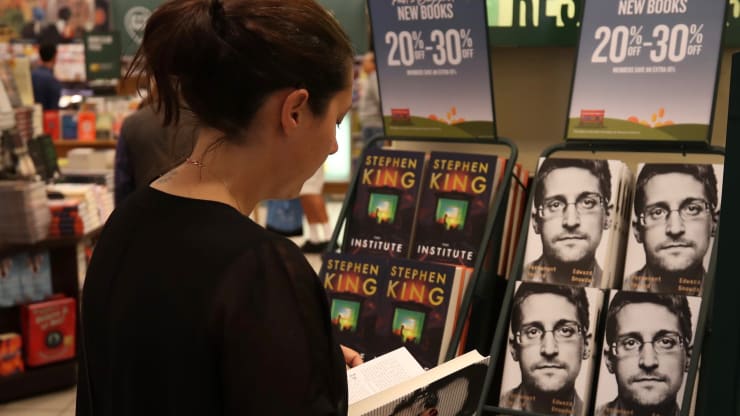This article is more than
8 year oldFilm review: is Oliver Stone's Snowden really so terrible?
"How would you describe the internet to a child?" someone asks Edward Snowden (Joseph Gordon-Levitt) in a CIA job interview in Oliver Stone's new film. His reply is almost touchingly naive: it's a tool, he says, "that has the power to let everyone in the world understand each other".
This proves true in Stone's laudatory biopic, which he co-wrote with Kieran Fitzgerald from books by Luke Harding and Anatoly Kucherena, though not in the utopian way that young Snowden, then a Bush-backing American patriot, means it. First, the US government comes to understand, or at least to know, us. And then, when Snowden releases proof of how far-reaching this knowledge is, we come to know that government, perhaps even better than we might have wished. When Snowden passes on what he knows to documentary filmmaker Laura Poitras (Melissa Leo) and journalist Glenn Greenwald (Zachary Quinto) in a Hong Kong hotel room, he hides under a blanket to type in his computer's password. The film invites you to join him – but offers precious little encouragement to come out from under it.
The film takes us in linear, even rudimentary, order through the turning points in Snowden's life
Stone laid out some nutball theories about JFK with incandescent urgency, so it's surprising that in detailing an actual government conspiracy, he's made one of the most stylistically subdued, even staid, films of his career — and with cinematographer Anthony Dod Mantle to boot, who managed to persuade even Ron Howard to indulge his experimental side on the film Rush. It's a little disorienting to see the manic visionary of the '80s and '90s so thoroughly tamed, making easily accessible films about good liberal issues rather than raging against the heavens. He now seems to save this more extreme side of himself for documentaries, in which he's lionised figures like Fidel Castro and Hugo Chavez, and laid out his own 10-part history of the United States.
Using Snowden's sessions with Poitras, Greenwald and, eventually, Guardian reporter Ewen MacAskill (Tom Wilkinson) as a framing device, the film takes us in linear, even rudimentary, order through the turning points in Snowden's life. It begins with Special Forces training, in which Snowden is discharged after the strain on his scrawny frame results in a broken tibia. It's not the result of any one trauma but the accumulation of dozens of tiny stress fractures, which build up over time until one day his bones simply snap. So it is with his intelligence work. He's an eager pupil at first, proudly showing off his talents in front of his CIA superior, Corbin O'Brian (Rhys Ifans), whose sallow complexion and drawn features suggest he might keep a jar of blood in his desk for easy snacking. But his skills are such that he's promoted into places where he learns things he'd rather not know.
Leaky vessel
By Snowden's side much of the time is his girlfriend, Lindsay Mills (Shailene Woodley), and though Stone's movies have often treated women as peripheral ornaments, Snowden keeps her in the frame, a liberal conscience to his questioning conservative. Their relationship becomes the movie's unlikely centre, in part because it's so much more engrossing than the cloak-and-dagger stuff around it. Stone is tethered to real life rather than inspired by it, building character moments around incidents that don't measure up to fiction's usual standards.
It's not a good sign when Nicolas Cage gives one of your movie's most subdued performances
Woodley's earthy forest-spirit vibe also serves as a counterpoint to some of the movie's more studied performances: Gordon-Levitt's mimicry of Snowden's low drawl makes him sound a little like The Silence of the Lambs' Buffalo Bill. It's not a good sign when Nicolas Cage gives one of your movie's most subdued performances, although Ifans' lupine scowl pays off in a scene where he menaces Snowden via a floor-to-ceiling video conference screen, his head so large it looks as if he could gobble up this pasty hacker in one quick bite.
Building the film around interviews that would become a Pulitzer Prize-winning series of exposés is a solid device, although it requires Poitras’ character to function more as an empathetic therapist than an Oscar-winning documentarian. And it leaves the movie in the curious position, especially for Stone, of ending on a note of unearned optimism. Edward Snowden blew the lid off a massive data collection process whose tendrils reached nearly everywhere — but then what? O'Brian isn't wrong when he tells Snowden that, contra Benjamin Franklin, most Americans are happy to trade absolute liberty for the promise of security, even if they'd rather bargain with other people's freedoms rather than their own.
This film glosses over the thorniest issues in play – both in terms of the US government's actions and the unintended consequences of Snowden's disclosures – and settles for a safe, familiar account of one man standing up against the system. Lone crusaders are some of Hollywood's favourite figures because they're an escape valve for the audience's conscience; their actions absolve us of the necessity to follow suit. Snowden makes a closing plea for mass action, but it's buried in voiceover and swamped by the closing images of Snowden's smiling face. If he's happy, what do we have to worry about?
★★★☆☆
If you would like to comment on this story or anything else you have seen on BBC Culture, head over to our Facebook page or message us on Twitter.
And if you liked this story, sign up for the weekly bbc.com features newsletter, called “If You Only Read 6 Things This Week”. A handpicked selection of stories from BBC Future, Earth, Culture, Capital, Travel and Autos, delivered to your inbox every Friday.
Keywords
Newer articles
<p>Wang Yi tells Antony Blinken ‘disruptions’ could arise amid threat of sanctions over China’s support for Russia’s defence industry</p>
King’s Funeral Plans Dusted Off—as Health Remains a Mystery
Megan Thee Stallion’s Ex-Makeup Guru Talks. It’s Not Pretty.
Here’s why Iran decided not to attack Israel again
Bill Maher's audience roars with laughter after he mocks Don Lemon to his face
Can Zendaya make the leap from tween idol to Hollywood heavyweight?
MAJOR ANNOUNCEMENT: Buck Palace updates on King Charles’ condition
Trump lawyer tells SCOTUS that president could have immunity after ordering military to assassinate a political rival
Supreme Court might not give Trump sweeping immunity — but it's likely to give him the one victory he wants
What Weinstein Accusers Are Saying About the Shock Reversal



